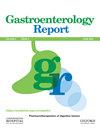胃癌患者术前 2-3 小时饮用 250 毫升葡萄糖溶液的胃残渣量、安全性和有效性:一项多中心、单盲、随机对照试验。
IF 3.8
3区 医学
Q2 GASTROENTEROLOGY & HEPATOLOGY
引用次数: 0
摘要
背景在结直肠手术中,术前 2-3 小时饮用碳水化合物已被广泛采用。然而,有关其在胃癌手术中应用的直接证据却很少。我们旨在评估在择期胃癌手术前 2-3 小时饮用 250 毫升 5%葡萄糖溶液的胃残渣量、安全性和有效性。88名胃癌患者被随机分为研究组和对照组。对照组患者按照传统方法在术前禁食 6-8 小时,而研究组患者在术前 2-3 小时饮用 250 毫升 5%葡萄糖溶液。气管插管后,立即通过胃镜抽吸胃内容物。研究最终分析了 83 名患者(研究组 42 人,对照组 41 人)。两组患者的基线特征相当。两组患者的残胃液量(35.86 ± 27.13 vs 27.70 ± 20.37 mL,P = 0.135)和 pH 值(2.81 ± 1.99 vs 2.66 ± 1.68,P = 0.708)无统计学差异。与对照组相比,研究组术前不适症状明显减少(口渴评分:1.49 ± 1.23 vs 4.14 ± 2.07,P < 0.001;饥饿评分:1.66 ± 1.18 vs 3.00 ± 2.32,P = 0.007)。结论择期胃癌患者在术前 2-3 小时饮用 250 毫升 5%葡萄糖溶液可降低口渴和饥饿评分,但不会增加胃残余容积和围手术期并发症。本文章由计算机程序翻译,如有差异,请以英文原文为准。
Gastric residual volume, safety, and effectiveness of drinking 250 mL of glucose solution 2-3 hours before surgery in gastric cancer patients: a multicenter, single-blind, randomized-controlled trial.
Background
Carbohydrate drinking 2-3 hours before surgery has been widely adopted in colorectal operations. However, there is little direct evidence regarding its application in gastric cancer surgery. We aimed to evaluate the gastric residual volume, safety, and effectiveness of drinking 250 mL of 5% glucose solution 2-3 hours before elective gastric cancer surgery.
Methods
We conducted an investigator-initiated, multicenter, randomized-controlled, parallel group, and equivalence trial. Eighty-eight patients with gastric adenocarcinoma were randomized into study or control group. Patients in the control group followed the traditional routine of 6-8 hours preoperative fasting, while those in the study group drank 250 mL of 5% glucose solution 2-3 hours before surgery. Immediately following tracheal intubation, gastric contents were aspirated through gastroscopy. The primary outcome was preoperative gastric residual volume.
Results
Eighty-three patients were eventually analysed in the study (42 in the study group and 41 in the control group). Two groups were comparable at baseline characteristics. There were no statistical differences in residual gastric fluid volumes (35.86 ± 27.13 vs 27.70 ± 20.37 mL, P = 0.135) and pH values (2.81 ± 1.99 vs 2.66 ± 1.68, P = 0.708) between the two groups. Preoperative discomfort was significantly more decreased in the study group than in the control group (thirst score: 1.49 ± 1.23 vs 4.14 ± 2.07, P < 0.001; hunger score: 1.66 ± 1.18 vs 3.00 ± 2.32, P = 0.007). There was no statistical difference in the incidence of postoperative complications (19.05% vs 17.07%, P = 0.815).
Conclusions
Drinking 250 mL of 5% glucose solution 2-3 hours before surgery in elective gastric cancer patients shows benefits in lowering thirst and hunger scores without increasing gastric residual volume and perioperative complications.
求助全文
通过发布文献求助,成功后即可免费获取论文全文。
去求助
来源期刊

Gastroenterology Report
Medicine-Gastroenterology
CiteScore
4.60
自引率
2.80%
发文量
63
审稿时长
8 weeks
期刊介绍:
Gastroenterology Report is an international fully open access (OA) online only journal, covering all areas related to gastrointestinal sciences, including studies of the alimentary tract, liver, biliary, pancreas, enteral nutrition and related fields. The journal aims to publish high quality research articles on both basic and clinical gastroenterology, authoritative reviews that bring together new advances in the field, as well as commentaries and highlight pieces that provide expert analysis of topical issues.
 求助内容:
求助内容: 应助结果提醒方式:
应助结果提醒方式:


